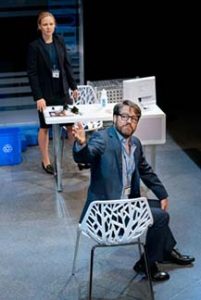By Lucy Komisar
In Tom Stoppard‘s “Travesties, Dada artist Tristan Tzara cuts up a page of text, throws the fragments into the air, and collects them to make a new work. I had the same feeling about how Stoppard wrote “The Hard Problem.”
Throw up issue of moral consciousness, of how science wires the brain, how capitalists (sometime predatory) make fortunes, how young quants or scientific brain analysts figure out how to use or scam the former, and throw in a Pilates instructor. Along with scenes of a Venice canal and the London City [financial district] skyline.
This pretentious play does not seriously address or answer the questions it is supposed to pose: where does morality come from, is it hardwired in the brain or developed by culture, and how does this affect how people interact – especially in the world of capitalism.
Oh, and for a ringer, let‘s throw in a bright researcher who has had a child out of wedlock at 15, given the girl up for adoption and years later goes to work for a company owned by the mega-capitalist who adopted the girl, and conveniently kept her birth name. Neither knows this back story. That‘s serious soap opera.
The text flits from one part of the hokey drama to another.
Starts like college talk, they have loose leaf binders. The music is jazzy.
It‘s very of the moment – a Pilates instructor, an Indian quant, a Chinese quant (only Asians can be quants), a hedge fund guy who is tough about money but has a sentimental side.
The philosophical problem of the brain and its connection to morality is little more than a veneer to make this play seem serious.

There‘s lots of trite sociology: survival strategies of self-interest vs cooperation, “the prisoner‘s dilemma‘ about who will betray who for advantage, who eats, gets eaten.
Hillary (Adelaide Clemens), who has the look and demeanor of a grad student, tells her college tutor Spike (Chris O‘Shea), “You‘re going miles out of way to take me home.” He replies “because cost benefit.” Means he hopes to sleep with her.
She declares, “Giving some to get something is not altruism…. Altruism means being good for its own sake.”
How did driving someone, even a prospective lover, home, become even mixed up with altruism?
More of the trendy dialogue. Spike: “I went to Pisa once, A conference, by Easy Jet. The control tower was a disappointment; a missed branding opportunity, one felt. You wouldn‘t want someone hanging on to your skirts who thinks when you‘ve seen one town in Tuscany you‘ve seen them all. I wouldn‘t know what to do with myself if there‘s no conference. I get antsy if there isn‘t a new journal to look at every day.” I guess this is satire.
The conversation later takes up the utility of mother love and the cost benefit of prenatal behavior. It seemed like dorm conversation. I was ready to flee sociology 101 and take an incomplete.
In case you are still in class, there are discussions about consciousness. Here‘s where we get to “the hard problem,” which is brain science. Leo (Robert Petkoff), who runs the small program at the center that hires Hillary, likes the soft side of analysis, not the techie quants. Leo speaks poetry. He and Hillary think that the study of mind is not science. There is free will and accountability.

Hilary says the brain registers with consciousness but you can‘t tell by watching wheels go round. Are you thrilled yet by this deep discussion?
It all somehow mixes with capitalism. I think this is where one of Tsara‘s papers failed to land. Jerry Khohl (Jon Tenney), the hedge fund guy who funds the research, calls Amal, the Indian quant (Eshan Bajpay), a “piece of shit…a dead quant.” Amal faints.
Then Khohl offers him a two-year contract not for research, but to make money. The market is irrational. Amal is the perfect City guy. Turns out the market is a belief system, and you transfer the skills. We get to analysis of performance being about risk taking, stress releases, hormones,
Amal the quant figures how to make money shorting the market. (Aside: In shorting, you bet that stocks will go down, sell them without owning them, then hope to buy them to deliver at a cheaper price. If you bet wrong, you lose.)
The best part of this is a terrific London skyline of St Paul‘s which is in the middle of the financial district. Most of the sets are less interesting: white desks and computer screens
I liked Ursula (Tara Summers) the professor, who is pleasingly flippant. Her companion Julia (Nina Grollman) is the only non-professional, but that‘s okay because she is a trendy Pilates instructor. This allows director O‘Brien to feature Hillary talking from a mat. And to cover all the bases, one of the quants, Bo (Karoline Xu), confesses to authoring a report that cut people from the universe because they didn‘t fit the outcome.

This play which claims to be about consciousness is a pretentious hokey melodrama.
“The Hard Problem.” Written by Tom Stoppard, directed by Jack O‘Brien. Lincoln Center 165 West 65th Street, New York City. 212-239-6200. Opened Nov 19, 2018; closes Jan 6, 2019. 12/15/2018.


Stoppard scares Americans. They don‘t want to appear ignorant or untrendy. To be on the safe side, he is praised. That‘s why Brits get away with loads of BS. At least in America. Time Magazine felt he was God‘s gift to Broadway.